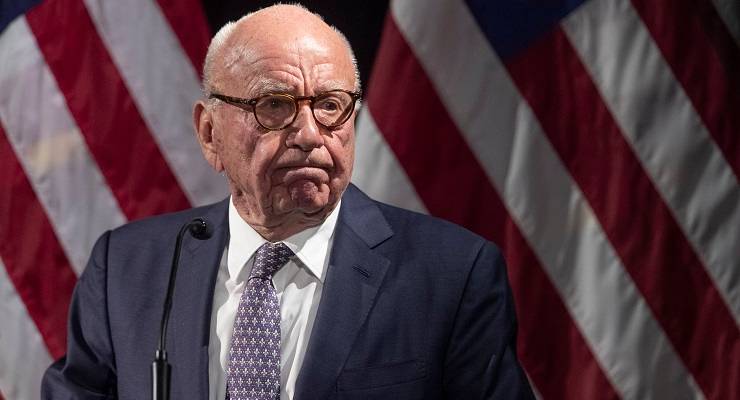
This is the second part of a two-part series on News Corp’s influence. Read the first part here.
It’s easy to mistake the present News Corp for what it once was: an organisation which — however flawed — had a core commitment to publishing news, whether in print, online or on television.
But its new version has smashed that model. In its place is a hybrid news and sales organisation where the lines which once separated journalism and marketing aren’t just blurred but have disappeared.
Now you will increasingly find journalists working alongside a new and thriving industry of product spruikers, spin doctors and the dreaded “reputation managers”.
A case in point is a venture called News Xtend which, in its own words, will help you “navigate the digital marketing wilderness to smash your business goals”.
“Powered by News Corp Australia and with a direct bat-phone to Google, Facebook and Microsoft, we provide powerful digital campaigns and first class service that our rivals can’t match,” the patter goes.
“With staff based across Australia, you have access to local experts who are masters of spruiking businesses — including getting you found on search engines, starting a conversation on social media and delivering your message where it matters most.”
This, in fact, is the very opposite of what a news business does. Rather than puncture spin it is actively promoting it.
Then there is News Native, another new venture which harnesses “the emotional power of branded content” to sell your message. How? An “innovative new ad product” called Real Time Native, which allows advertisers to integrate branded storytelling into the news cycle.
Real Time Native “harnesses the attention of breaking news headlines by crafting complementary native content that is in the moment”, giving customers “a new opportunity for advertisers to get closer than ever before to the news of the day”.
Almost incomprehensible, but it adds up to an advertiser getting even more exposure by hooking itself on to the news of the day.
Internationally News Corp has acquired a disruptor social media business called Storyful, which tells video news stories in a new way — but also gathers social media information to help corporates build a picture of what is being said about them, the first step in designing a strategy to protect themselves.
One of News Corp’s most successful divisions last year was the business data gathered by Dow Jones which is sold for “financial risk compliance” to large corporations. It’s valuable information for doing due diligence on a competitor or a takeover target. Dow will provide “customised investigative research” if needed.
As we’ve reported, News is also in the business of boosting promising digital start-ups in everything from gambling to aged care, but at the same time there appears to be no clear line ensuring that news reporters apply independent, critical coverage.
The destruction of the difference between church and state has produced a model where News is both gamekeeper and poacher.
It has also produced Sky News — a parallel universe where it is somehow OK that several of the channel’s most prominent personalities are former senior Liberal government staff members, in the case of former prime minister Tony Abbott’s former chief of staff, Peta Credlin, and former prime minister Malcolm Turnbull’s former chief of staff, Chris Kenny, and a prominent Liberal party donor and former Liberal speechwriter in the case of Alan Jones.
It’s even turned Credlin into a documentary maker, covering Victoria’s hotel quarantine failures — and favourably reviewed here on a News Corp website, news.com.au.
When news becomes marketing is it any wonder, either, that News’ political coverage is indistinguishable from a News Corp influence campaign?
Turnbull, who signed Kevin Rudd’s petition for a royal commission last week, has likened News Corp and its modus operandi to a political party, working with right-wing politicians to influence policy and elections and to destroy politicians who won’t agree to a partnership with the Murdochs.
“It attacks its enemies and protects its friends, as it did Abbott and as it is today protecting Morrison to the point of ignoring big issues of accountability,” Turnbull wrote in his political memoir.








What goes unnoticed is that the news organisation in times of local news drought creates a issue, reports it as a news item of local issue then conducts a campaign for something they manufactured and the local polls are too stupid or intimidated or both to say what a lot of rubbish. – of the local papers the Courier Mail is the past master of it then followed by The Australian and very rarely the Sydney Morning Herald [because it has a bigger population base and does not runout ‘news items’ plenty going on in Sydney – too much to report.
‘Architecture’ of LNP political and/or IPA etc. corporate PR shaping perceptions, emotions and actions of the electorate, parties and MPs, while masquerading as vaguely credible news….
Mudoch is the 20th and 21st Century’s Moriarty . His pustulate tentacles corruptly wrap around the globe , squeezing the life from Democracies , in his insatiable lust for unrivaled power and dominance . It’s time he met his Reichenbach Falls .
You could say the same for Nine. Whose print media including Sydney Morning Herald is now just another one of a long list of “brands”
“no longer” Rip van Winkle?
Indeed. In the UK, Private Eye magazine has for decades been recording examples of Murdoch’s rags spruiking or boosting other Murdoch ventures under a thin disguise of news or reviews .
“Now you will increasingly find journalists working alongside a new and thriving industry of product spruikers, spin doctors and the dreaded “reputation managers”.”
Says it all.